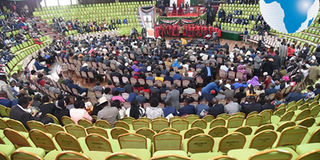Time we had fresh blood, fresh brains for new ideas

Delegates gather at Bomas of Kenya, Nairobi, on November 27, 2019 for the launch of the Building Bridges Initiative report. PHOTO | FILE | NATION MEDIA GROUP
What you need to know:
- I think we need to remain clear-eyed and honest in terms of assessing the needs of our country and the proposals on the table.
- Kenyans should seek to create a fair state, where everybody has equal access to public resources and where merit and talent are the key drivers of advancement.
A clever father who is desirous to enjoy his reign as the local tyrant knows to invest time and resources in good intelligence — humint (wife) and, if necessary, sigint (children’s social media and history tab).
As a good case officer, he must diligently control and exploit assets, directly and indirectly (that is, listen to rumours), for the purpose of exerting influence and collection of data, which is then analysed to produce decision-quality information. (You are advised to revisit Robert Ludlum, and if you have never heard of him, you missed the fun).
Using my network of domestic sources, I have received surprisingly fresh feedback from one of my daughters about this whole Covid-19 scenario and how we have been thinking about it.
We have assumed that home is a place of safety, especially for children, and that if they stay home they will avoid disease and be OK.
We have all assumed that every parent has moved mountains to find ways of keeping the children happy, healthy, educated and diverted while at home, even if it means allowing more screen time.
The feedback I got was that home is not a safe place for all children and that, for some, school is an escape from a dark, dangerous place. It is a perspective that had escaped my attention.
LEADERSHIP SHAKE-UP
I have been looking at the statistics on violence in the family without understanding them, like the Ethiopian Eunuch.
Sometimes, it takes a fresh voice to extract for us what is hiding in plain sight. This is the value of fresh blood, new eyes and a new brain on an assignment.
If the same people are looking at the same problem, they will always see the familiar. As a country, I suspect we will soon go through deep political changes in the coming months.
I don’t know what shape those changes will take but I think we need to remain clear-eyed and honest in terms of assessing the needs of our country and the proposals on the table.
We need to make a very strong case for fresh blood, fresh eyes, fresh brains and new ideas in the government of our country.
The existing stability in the political elite — 90 per cent of the folks lining up for big jobs were in government when I was in high school — is not good for the country.
A comprehensive shake-up — a spring clean, as it were — is overdue with the purpose of bringing to the fore a generation of younger, more modern, fresher faces in government and politics.
BREAK CYCLE
It is insanity to put maize, beans, carrots, cabbage and some left-over pumpkin into the sufuria, cook it and expect to serve saffron rice. It’s githeri you are going to have for dinner and God help your jaws.
If we go into an election with the same politicians and subject them to the same incompetent, corrupt and largely cooked process, the result will always be the same: corruption and violence. Kenya’s best hope is in a complete break with this toxic cycle.
It may well be that the BBI process has the potential to address many of these difficulties. But the fact remains that you can’t do reforms without reformers, and you can’t do new thinking without new brains.
Secondly, and more controversially, Kenyan politics risks creating inequalities of revolutionary proportions.
Government is the biggest business in town; whoever controls the government controls a ready spigot of cash, which is fed back into the political system to acquire and facilitate political domination, creating a vicious cycle.
A system of this nature, that creates the concept of unfair benefit and class exclusion, is dangerous and destabilising.
In this school of thought, the elite not only has its hands on the throat of the State but also its sharp teeth are sunk into the tit of largesse.
BREEDING CHAOS
In those who are excluded, this creates that clichéd feelings of relative deprivation and revolution of rising frustration and, before long, the have-nots will turn against the what-nots in violent confrontation.
I think Kenyans, first and foremost, should seek to create a fair state, where everybody has equal access to public resources and where merit and talent — rather corruption, nepotism and old boy networks — are the key drivers of advancement.
No Kenyan should have wealth that they did not work for and no Kenyan should be given a job they don’t deserve.
It is easy to feel allegiance to a system that treats you fairly, it is impossible to be loyal to an edifice that rejects you.
And fairness and inclusivity should not be the privilege of a few old politicians and their cronies. Giving a job or say to a politician from my tribe is not enough; the objective should be to create a system where everybody feels fairly treated.
That’s the difference between genuine, organic fairness and mechanical, fake fairness.
Kenya is a country of young people. It’s long-term prospects depend on how these young people are brought up, led and motivated.





